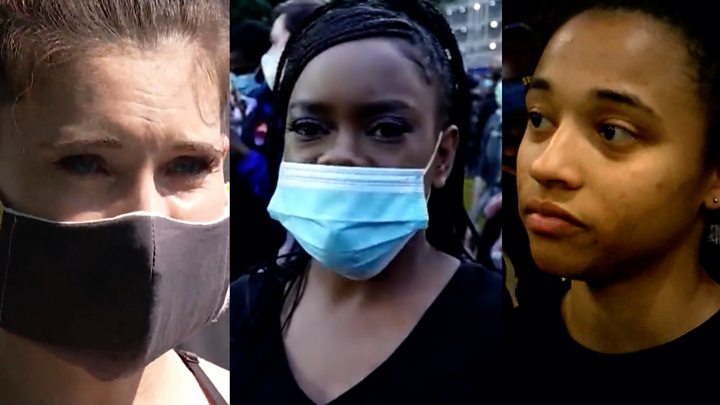New charges have been announced against all of the sacked police officers present at the death of African American George Floyd in Minneapolis.
The charge against Derek Chauvin has been elevated to second-degree murder, court documents show.
The other three officers face counts of aiding and abetting murder, the documents state.
Floyd's death has sparked huge protests across the US against racism and the police killings of black Americans.
The vast majority of demonstrations over the past eight days have been peaceful, but some have turned violent and curfews have been imposed in a number of cities.
Derek Chauvin had initially faced charges of third-degree murder and second-degree manslaughter. These will stay on his charge sheet.
The other three sacked officers are Thomas Lane, J Alexander Kueng and Tou Thao. They all face charges of aiding and abetting second-degree murder, and aiding and abetting second-degree manslaughter.
Minnesota Senator Amy Klobuchar said on Twitter that the latest charges were "another important step for justice".
But Floyd family lawyer Benjamin Crump told CNN that they believe the charge against Derek Chauvin should be first-degree murder. He said the family had been told that the investigation was ongoing and the charges could change further.
What do the charges mean?
First- and second-degree murder under Minnesota law require proof that the defendant intended to kill. First-degree in most cases requires premeditation, with second-degree more related to crimes of passion.
A third-degree murder conviction would not require proof that the defendant wanted the victim to die, only that their actions were dangerous and were carried out without regard to human life.
A second-degree murder conviction can carry a sentence of up to 40 years, 15 longer than for third-degree.
George Floyd death
What's the background?
The US protests began after a video showed Floyd, 46, being arrested on 25 May in Minneapolis and a white police officer continuing to kneel on his neck for several minutes even after he pleaded that he could not breathe.

Media playback is unsupported on your device
The Floyd case follows the high-profile cases of Michael Brown in Ferguson, Missouri; Eric Garner in New York; and others that have driven the Black Lives Matter movement in recent years.
For many, the outrage over Floyd's death also reflects years of frustration over socio-economic inequality and discrimination.
https://news.google.com/__i/rss/rd/articles/CBMiM2h0dHBzOi8vd3d3LmJiYy5jby51ay9uZXdzL3dvcmxkLXVzLWNhbmFkYS01MjkxNTAxOdIBN2h0dHBzOi8vd3d3LmJiYy5jby51ay9uZXdzL2FtcC93b3JsZC11cy1jYW5hZGEtNTI5MTUwMTk?oc=5
2020-06-03 19:52:30Z
52780811678261
Tidak ada komentar:
Posting Komentar